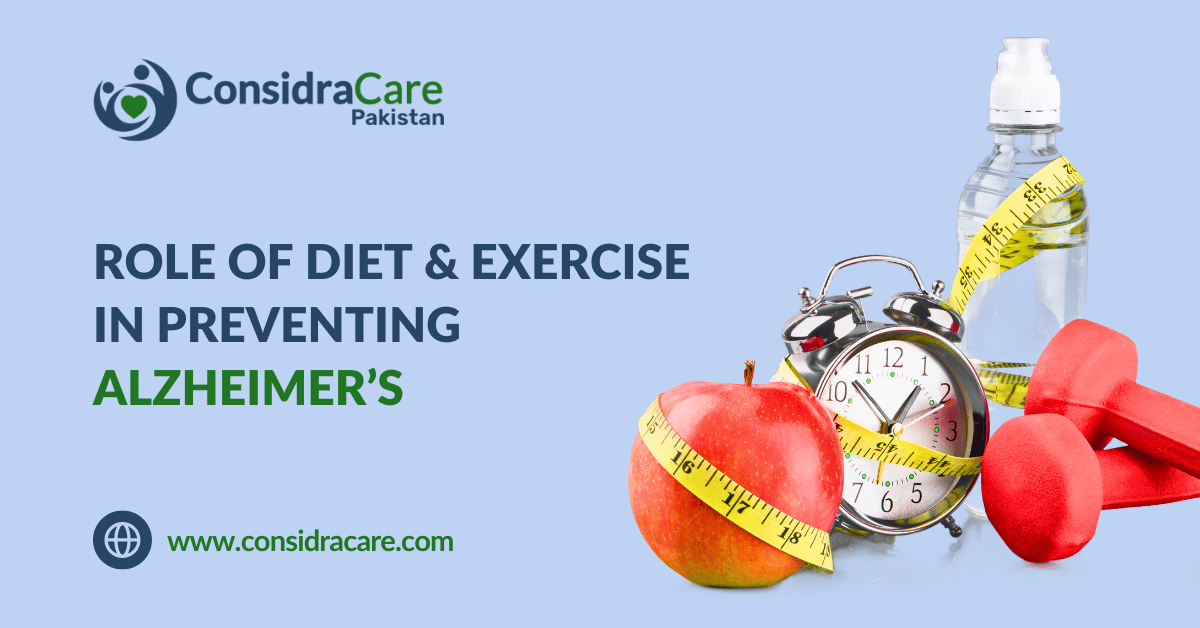Alzheimer’s disease remains a pressing concern for the aging population in Pakistan. According to a study published in the Journal of Neurological Sciences, dementia, including Alzheimer’s disease, affects 6.9% of Pakistani seniors. This alarming statistic highlights the need for proactive measures to prevent or delay the onset of this devastating disease.
In this article, we will explain how diet and exercise are essential for preventing or delaying the onset of this disease, offering seniors and their families hope and practical advice.
Table of Contents
ToggleWhat is Alzheimer’s Disease?
In order to discuss the importance of diet and exercise in preventing Alzheimer’s, it’s crucial to first understand what Alzheimer’s disease actually is. Alzheimer’s is a progressive neurological disorder that mainly affects seniors and leads to a decline in cognitive functions such as memory and reasoning skills. This decline can have a significant impact on an individual’s daily life, making it difficult to perform routine tasks and maintain independence.
Symptoms of Alzheimer’s Disease:
Alzheimer’s disease gradually affects the brain and causes changes in thinking and behavior. Here are some common symptoms to watch out for:
- Memory Loss
- Poor Judgment
- Social Withdrawal
- Confusion and Disorientation
- Difficulty with Problem Solving
- Changes in Mood and Personality
Role of Diet in Preventing Alzheimer’s Disease:
Recent studies have demonstrated that making certain dietary choices can have a profound impact on preventing or delaying the onset of Alzheimer’s disease. One diet that has been closely studied for its cognitive benefits is the MIND diet. This diet combines elements of the Mediterranean and DASH diets and is characterized by a focus on plant-based foods, particularly berries and green leafy vegetables.
1. Key Foods in the Diet:
The MIND diet emphasizes the consumption of the following foods including.
- Berries
- Green Leafy Vegetables
- Nuts
- Grains
- Fish
These foods are not only delicious but also have numerous benefits for brain health. Berries and green vegetables are rich in antioxidants, which play a critical role in fighting inflammation and oxidative stress, both of which are key factors in maintaining cognitive health. The MIND diet recommends moderation in the intake of animal products and foods high in saturated fats. These should be consumed in limited quantities to support brain health.
It’s important to note that while the MIND diet is associated with a reduced risk of developing Alzheimer’s disease, it should not be considered a cure. Instead, it is a lifestyle approach that supports cognitive health.
Role of Exercise in Preventing Alzheimer’s:
Regular exercise is another pivotal factor in preventing Alzheimer’s. Physical activity enhances blood flow to the brain and promotes overall health, which can delay the onset or progression of cognitive decline.
1. Multidimensional Benefits of Exercise:
Exercise improves cardiovascular health, which in turn enhances brain cell connections, oxygen delivery, and glucose uptake in the brain. Moreover, exercise stimulates the growth of new neurons, a process essential for maintaining cognitive health.
A significant discovery is the role of the hormone irisin, produced during physical activity. Irisin aids in creating BDNF (Brain-Derived Neurotrophic Factor), crucial for the health of the hippocampus, the brain region associated with memory. Additionally, irisin has anti-inflammatory effects, countering brain inflammation linked to Alzheimer’s.
In Alzheimer’s, inflammation often results from the immune system’s response to amyloid plaques, leading to neuron damage. Exercise’s ability to reduce this inflammation is a vital aspect of its protective role against Alzheimer’s.
2. Exercise Recommendations:
Engaging in regular, moderate-intensity exercise such as
- Walking
- Swimming
- Yoga
can be highly beneficial. The key is consistency and incorporating activities that are enjoyable and sustainable in the long term.
Looking for expert Alzheimer’s care for your loved ones in Pakistan? ConsidraCare Pakistan provides personalized support by compassionate and trained caregivers. Contact us and ensure the welfare of your loved ones.

Challenges Faced by Individuals with Alzheimer’s:
Living with Alzheimer’s disease can be very challenging. It involves a gradual loss of independence, difficulty in communication, and a decline in physical abilities. Caring for someone with Alzheimer’s can be even more challenging as it requires managing their mood swings, dealing with sleep disturbances, and coping with their gradual loss of independence. These challenges can create emotional strain for families, adding layers of complexity to an already difficult situation.
Conclusion:
Adopting a diet that is rich in plant-based foods and maintaining a regular exercise routine can play a significant role in preventing Alzheimer’s disease. Though these lifestyle changes may not cure the condition, they do offer a proactive approach to reducing the risk and improving overall health.
FAQ’s:
1. Can diet help prevent Alzheimer’s disease?
Yes, The MIND diet with its focus on plant-based foods like berries and greens, can help prevent Alzheimer’s.
2. What are the key foods in the MIND diet?
The MIND diet recommends consuming berries, green leafy vegetables, nuts, grains, and fish to improve brain health.
3. How does exercise help prevent Alzheimer’s disease?
Regular exercise improves blood flow to the brain and reduces inflammation. This can delay cognitive decline.
4. What types of exercise are recommended?
Regular moderate exercise like walking, swimming, and yoga is highly beneficial. Enjoyable and consistent activities are key for long-term sustainability.
5. What are the challenges faced by individuals with Alzheimer’s?
Individuals with Alzheimer’s face a decline in physical abilities, a gradual loss of independence, and difficulty communicating.


